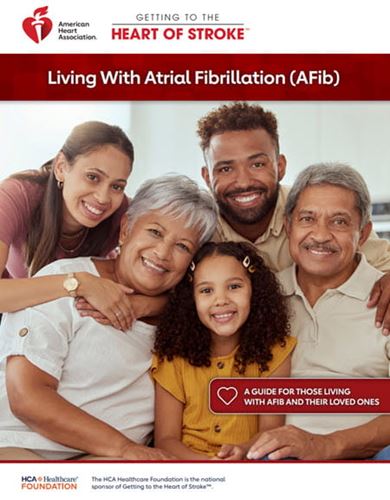What is Atrial Fibrillation?
Quick Facts
- Atrial fibrillation is an irregular heartbeat.
- AFib can lead to blood clots, stroke and heart failure.
- It is a changing disease with some treatment options.
Video: Learn about AFib and your heart
Atrial fibrillation is an irregular heartbeat, or arrhythmia. Atrial fibrillation, also known as AFib or AF, can lead to blood clots, stroke, heart failure and other heart-related complications. AFib is the most common type of irregular heart rhythm. Five million Americans are estimated to be living with AFib today, and more than 12 million people are projected to have it by 2030.
Here’s how patients have described their experience:
“My heart flip-flops, skips beats, and feels like it’s banging against my chest wall, especially if I’m carrying stuff up my stairs or bending down.”
“I was nauseated, light-headed and weak. I had a really fast heartbeat and felt like I was gasping for air.”
“I had no symptoms at all. I discovered my AFib at a regular check-up. I’m glad we found it early.”
What happens during AFib?
Normally, your heart contracts and relaxes to a regular beat. In AFib, the upper chambers of the heart, or the atria, beat irregularly. Not enough blood is being pumped out of the atria, so blood pools there. The pooled blood can clot, which can be very dangerous.
If a blood clot forms, it can be pumped out of the heart to the brain. This blocks the blood supply to the brain and cause a stroke.
About 12% to 20% of people who have strokes caused by blood clots or attributed to large or small vessel disease have this abnormal heart rhythm. The clot risk is why people with this condition may be prescribed blood thinners*.
AFib can double the risk of death and is linked with an estimated fivefold increased risk for stroke. Yet many people are unaware that AFib is a serious condition.
Watch an animation of atrial fibrillation.
What are the stages of AFib?
Like many heart conditions, AFib is a progressive disease. It has four stages:
Stage 1: At risk for AFib
You have not been diagnosed with AFib and can take action to prevent it from developing. You should talk with your health care professional about detecting and treating AFib early, especially if you have AFib risk factors.
Stage 2: Pre-AFib
You have not been diagnosed with AFib, but there may be abnormal structural or electrical problems in your heart that can lead to it. Your health care professional will closely watch to see if AFib develops. You may begin treatment early to slow or stop the progression.
Stage 3: AFib
You have been diagnosed with AFib. You and your health care professional will discuss how severe your condition is and the best treatment for you. Treatment could include medications to control the heart’s rhythm or rate, surgery or managing other health conditions. You will also learn how to reduce your risk of having a stroke. Your stroke risk may change with time. Your health care team can use a risk calculator to find out your risk and guide treatment decisions.
Stage 4: Permanent AFib
You have permanent AFib that can’t be treated with medications or surgery. You can still talk with your care team about managing your other health conditions, which may lessen AFib symptoms.
It’s important to recognize the different stages of AFib. Understanding your stage can help you prevent AFib, catch it early or know how far your condition has progressed. You and your health care professional can then decide on the best treatment plan for you.
What is atrial flutter vs. atrial fibrillation?
Like AFib, atrial flutter is a kind of abnormal heart rhythm. However, it’s different from AFib and not as common.
During atrial flutter, the heart’s upper chambers (atria) contract very fast but in a coordinated rhythm. In AFib, the atria contract in a chaotic way, or “quiver.”
Atrial flutter and AFib do have similar symptoms. Learn more about atrial flutter.
What should I do to manage AFib?
If you think you or someone you love may have AFib, here are your most important steps:
- Learn more about what AFib is
- Know the symptoms
- Get the right treatment
- Reduce your risk for stroke, heart failure or other complications
We’re here to help you live your healthiest life!








